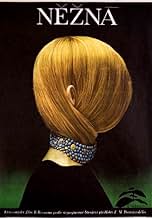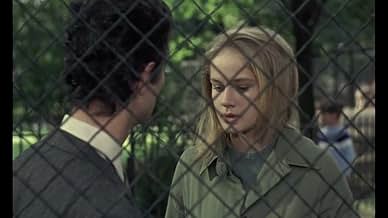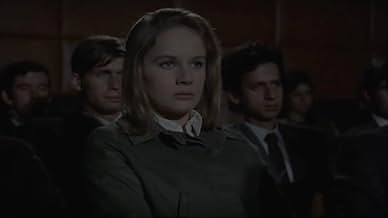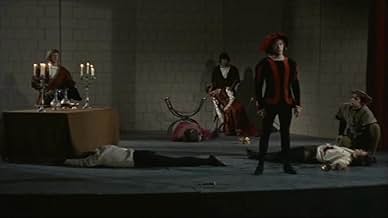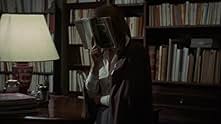IMDb-BEWERTUNG
7,3/10
3241
IHRE BEWERTUNG
Eine Frau bringt sich um und hinterlässt ihrem trauernden Ehemann keine Erklärung. Wir erfahren in Rückblenden, wie sie sich kennen gelernt und geheiratet haben und wie es ihr nicht gelungen... Alles lesenEine Frau bringt sich um und hinterlässt ihrem trauernden Ehemann keine Erklärung. Wir erfahren in Rückblenden, wie sie sich kennen gelernt und geheiratet haben und wie es ihr nicht gelungen ist, ihren Lebensstil an seinen anzupassen.Eine Frau bringt sich um und hinterlässt ihrem trauernden Ehemann keine Erklärung. Wir erfahren in Rückblenden, wie sie sich kennen gelernt und geheiratet haben und wie es ihr nicht gelungen ist, ihren Lebensstil an seinen anzupassen.
- Regie
- Drehbuch
- Hauptbesetzung
- Auszeichnungen
- 1 wins total
Empfohlene Bewertungen
Bresson is one of the great artists of cinema. Une femme douce a masterpiece and probably his most satisfying film.
Une femme douce is enigmatic, subtle, full of ellipses and misunderstandings. It is a moving analysis of the loneliness of a marriage and the unsatisfactory human condition: on the one hand there is blindness to reality, and on the other the intuition of a need and an impossibility to transcend that artificial reality that we construct for ourselves.
The characters are locked in a life of sufficient economic relief, in a complacent conformity that suffocates the young woman. The film narrates this chronic dissatisfaction with a life that is reduced to systematically improving material conditions.
Without stridency, without effects, with profound humility, Bresson's style was never more suitable, never more static and transcendent than in this film of two solitary beings: a man locked in his own prison and a woman caged in the golden cage of economic security.
The first scene shows us the girl's suicide in a static and unforgettable shot: the table that seems to collapse eternally on the balcony indicates that the girl has just jumped into the void and at the same time gives the sensation of an unfinished action, which It seems to stop in time.
Next the husband remembers before the corpse how he met her, fell in love with her, and saved/bought her.
The girl has had a past of economic hardship, of squalor; the boy has had a setback that has taught him how fragile prosperity is.
There is something of a hunted and trapped beast in Sanda's gaze. From there everything is mystery and conjecture in the marriage relationship.
Une femme douce is the great leap in Bresson's style towards his final maturity, that of works in color. Afterwards there will be no substantial purges.
I only have one scene left over: that awful representation of Hamlet, with its subsequent commentary, seems like a declaration of principles, an aesthetic creed enunciated without any elegance. An incomprehensible beginner's mistake in an author in full maturity.
Une femme douce is enigmatic, subtle, full of ellipses and misunderstandings. It is a moving analysis of the loneliness of a marriage and the unsatisfactory human condition: on the one hand there is blindness to reality, and on the other the intuition of a need and an impossibility to transcend that artificial reality that we construct for ourselves.
The characters are locked in a life of sufficient economic relief, in a complacent conformity that suffocates the young woman. The film narrates this chronic dissatisfaction with a life that is reduced to systematically improving material conditions.
Without stridency, without effects, with profound humility, Bresson's style was never more suitable, never more static and transcendent than in this film of two solitary beings: a man locked in his own prison and a woman caged in the golden cage of economic security.
The first scene shows us the girl's suicide in a static and unforgettable shot: the table that seems to collapse eternally on the balcony indicates that the girl has just jumped into the void and at the same time gives the sensation of an unfinished action, which It seems to stop in time.
Next the husband remembers before the corpse how he met her, fell in love with her, and saved/bought her.
The girl has had a past of economic hardship, of squalor; the boy has had a setback that has taught him how fragile prosperity is.
There is something of a hunted and trapped beast in Sanda's gaze. From there everything is mystery and conjecture in the marriage relationship.
Une femme douce is the great leap in Bresson's style towards his final maturity, that of works in color. Afterwards there will be no substantial purges.
I only have one scene left over: that awful representation of Hamlet, with its subsequent commentary, seems like a declaration of principles, an aesthetic creed enunciated without any elegance. An incomprehensible beginner's mistake in an author in full maturity.
Robert Bresson would be the last filmmaker I would think to adapt any story by Fyodor Dostoyevsky, a man who might be the greatest writer of melodrama- and melodrama as in gut-wrenching, emotional stuff, with a characters in, for example, Crime and Punishment having a big screaming or dramatic fit, all described in massive amounts of painstaking detail (mostly so Dostoyevsky could get paid by the word, perhaps). Because Bresson was a filmmaker who was completely uncompromising for what his vision required: usually non-professionals, saying dialog with a passive, almost restrained quality, with emotion held back until the most necessary (if at all) moments. Bresson was even on record once saying he didn't like sets or actors for that matter. But with Dostoyevsky's story he crafts another work that is all his own while honoring the harsh view on the human heart that the author had. It's a story where one might be tempted to take the woman's side, or (arguably) that she even did the right thing for herself at the end (or, as we at the start, at the beginning told backwards), but it's never that easy.
A Gentle Woman leans more to searching for common sense where there is none: Elle is a simple girl in a family that doesn't treat her well (we don't see this, we just hear it second-hand), and has a gentle quality (or 'meek' as Dostoyevsky's story was originally titled) that somehow allures Luc, who works as a pawnbroker. He pursues her, even though she's not much interested in his advances ("I told you not to follow me," she says to him as he follows her up to his house, in a tone soft but firm). He marries her. They seem momentarily at peace, but this soon breaks: Luc is continually insecure with himself, in a sense, because he can never feel secure in his relationship. Unlike That Obscure Object of Desire, where there was a mind-game involving the sex in the possessive relationship, there's no question that they do go to bed. It's the whole factor of what's really there in terms of trust, love, redemption, and above all a connection between two people. A scene that could be in a silent film (a form Bresson desperately would love to have tried), the couple are watching a film in a theater, and she is sitting next to a guy on her other side. Luc can't stand this, and almost on instinct he stands so the two can switch. A glance, or a couple of glances, speak a thousand ideas in a Bresson film.
In fact it's Bresson's attempts, as in other films, to try and intellectualize an emotional downward spiral that gains interest. Because it's the opposite of your usual melodrama, where the characters get all excited and angry and yelling and lots of misunderstandings and so on, the style is stripped down, leading to what is a much more distressing relationship they're in. Neither one can give in, but Elle just can't seem to leave him or go through an affair. And Luc likewise can't seem to ever go to lengths of domestic violence or on the flip-side leaving him. It's all about him having her, not the other way around, and the moments that she tries and asks him about his past doings (i.e. being fired from a bank teller job) he hesitates. There's a mold in shape that he can't seem to break of her, and by the time he goes for it and says over and over "I love you" it's clear as day- she's already past that point saying "I thought you were going to leave me." Enigmatic, maybe, it depends on the viewer.
It might be understandable this is one of Bresson's least available selections (no DVD yet, and a very paltry availability on the internet quarters of VHS sales), even though it shouldn't be. It's a fascinating experiment in dissecting character through narrative (albeit Bresson cuts back and forth between Luc at Elle's dead body at the bed a wee bit much through good narration from him), and in revealing little things about the relationship for a modern audience. There's a subtext I liked that dealt with diversions, theater, television, films, that are like little respites for the two of them (for Elle more-so, as we see with her interest in Hamlet). And, of course, the Catholic dimension of feeling- from Dostoyevsky carried over into Bresson- is felt more that almost any other of his films; divorce, it seems, is never called into question. This makes it dangerously close to being behind-the-times with its ultimately tragic fate for the characters.
But it also puts up an ultimatum of morality, not just for Luc but for Elle in hindsight: the film doesn't condone suicide, for all of the poetic splendor it's revealed in at the start and finish (not to mention that amazing final shot of the coffin being nailed in). Many interpretations, existential, feminist, even Marxist to a smaller extent, could be taken into account. One thing is for certain: A Gentle Woman isn't an easy film to digest, but for those willing to give it a shot it offers some intriguing layers beneath the subdued manner. By the way, watch for the scene that finally comes up that was taken for the (somewhat misleading) video cover; it's a total 180, aside from the basic initial physical motion, of a similar scene in Goodfellas!
A Gentle Woman leans more to searching for common sense where there is none: Elle is a simple girl in a family that doesn't treat her well (we don't see this, we just hear it second-hand), and has a gentle quality (or 'meek' as Dostoyevsky's story was originally titled) that somehow allures Luc, who works as a pawnbroker. He pursues her, even though she's not much interested in his advances ("I told you not to follow me," she says to him as he follows her up to his house, in a tone soft but firm). He marries her. They seem momentarily at peace, but this soon breaks: Luc is continually insecure with himself, in a sense, because he can never feel secure in his relationship. Unlike That Obscure Object of Desire, where there was a mind-game involving the sex in the possessive relationship, there's no question that they do go to bed. It's the whole factor of what's really there in terms of trust, love, redemption, and above all a connection between two people. A scene that could be in a silent film (a form Bresson desperately would love to have tried), the couple are watching a film in a theater, and she is sitting next to a guy on her other side. Luc can't stand this, and almost on instinct he stands so the two can switch. A glance, or a couple of glances, speak a thousand ideas in a Bresson film.
In fact it's Bresson's attempts, as in other films, to try and intellectualize an emotional downward spiral that gains interest. Because it's the opposite of your usual melodrama, where the characters get all excited and angry and yelling and lots of misunderstandings and so on, the style is stripped down, leading to what is a much more distressing relationship they're in. Neither one can give in, but Elle just can't seem to leave him or go through an affair. And Luc likewise can't seem to ever go to lengths of domestic violence or on the flip-side leaving him. It's all about him having her, not the other way around, and the moments that she tries and asks him about his past doings (i.e. being fired from a bank teller job) he hesitates. There's a mold in shape that he can't seem to break of her, and by the time he goes for it and says over and over "I love you" it's clear as day- she's already past that point saying "I thought you were going to leave me." Enigmatic, maybe, it depends on the viewer.
It might be understandable this is one of Bresson's least available selections (no DVD yet, and a very paltry availability on the internet quarters of VHS sales), even though it shouldn't be. It's a fascinating experiment in dissecting character through narrative (albeit Bresson cuts back and forth between Luc at Elle's dead body at the bed a wee bit much through good narration from him), and in revealing little things about the relationship for a modern audience. There's a subtext I liked that dealt with diversions, theater, television, films, that are like little respites for the two of them (for Elle more-so, as we see with her interest in Hamlet). And, of course, the Catholic dimension of feeling- from Dostoyevsky carried over into Bresson- is felt more that almost any other of his films; divorce, it seems, is never called into question. This makes it dangerously close to being behind-the-times with its ultimately tragic fate for the characters.
But it also puts up an ultimatum of morality, not just for Luc but for Elle in hindsight: the film doesn't condone suicide, for all of the poetic splendor it's revealed in at the start and finish (not to mention that amazing final shot of the coffin being nailed in). Many interpretations, existential, feminist, even Marxist to a smaller extent, could be taken into account. One thing is for certain: A Gentle Woman isn't an easy film to digest, but for those willing to give it a shot it offers some intriguing layers beneath the subdued manner. By the way, watch for the scene that finally comes up that was taken for the (somewhat misleading) video cover; it's a total 180, aside from the basic initial physical motion, of a similar scene in Goodfellas!
Robert Bresson has an established reputation as one of the most artistic and "difficult" directors in history, but two out of his three films that I have watched so far ("Une Femme Douce" and "Four Nights Of A Dreamer" - the third is "Mouchette", for the record) are quite accessible - if you approach them on their own terms. "Une Femme Douce" unfolds at its own pace, and although it has the structure of a mystery, it is more of a psychological drama. Bresson's precise framing is notable, and the main theme of trying to find spirituality in a money-driven world is as timely as ever. Bresson can also be credited for introducing Dominique Sanda to the world (this is her acting debut), and we thank him for it. A quietly absorbing, subtly powerful film. *** out of 4.
This movie Is sort of not what I expected From Robert Bresson.It was his first color film and is not as intense as his earlier films.Thou deals with the themes of grace and suicide(his trademarks)in an obtrusive style.'A Gentle Woman' is definitely a very underappreciated movie.If you like him you should search for it a your local video store.I didn't understand the movie when i first saw it,but it improves greatly after a few viewings.
The nail in the coffin in this extraordinary film is very similar to the burnt out stake at the end of Bresson's 'The Trial of Joan of Arc'. It says quite simply, this is the end, it is finished. The tortured soul of the woman played to perfection by Dominique Sanda seeks a finality to her suffering, and her combat with the world. She has had enough of material values and struggles, and like any inwardly imprisoned soul, she achieves her release. The playing time of the film is short but it contains many images of the world surrounding her; a visit to a cinema and a mediocre film on the screen, watching a performance of 'Hamlet', giving too much money away in her pawnbroker husband's shop. She does not relate to this, and her husband, brilliantly acted by Guy Frangin, tries to tame her into accepting the ways of a selfish, money orientated world. She states clearly she is not concerned with money, and as far as I can see she marries out of a sense of despair and not love, perhaps knowing that her husband will push her to the limit of endurance and give her the strength to execute herself. As in the Joan of Arc story, she is resigned to execution as the only way out of an existence she cannot understand. For Elle (which literally means she) her husband will be her executioner, not by intent, but by simply being the very opposite to her with his soiled humanity. She aims a gun at his head and Sanda's eyes say it all. For a moment she wants to kill her killer, but knows by putting down the gun that she is the one to be killed, and that person can only be herself. As for the film itself, only Bresson could have made it, with his austere vision of the human hell we live in. Watch 'The Devil, Probably' and 'Mouchette' to see that only the killing of the body we inhabit can save us. A negative interpretation? I have no idea. It is just what I saw in this great and seldom seen film. I have a poor copy of it and it is a disgrace that unlike most of Bresson's films this one is so hard to find. It is up there with the finest he made, and his use of muted colour only enhances the trivialities and the transience of Paris in 1969. That Paris has gone, but a Paris with even more materialism has taken its place. For those who recall the city 50 years ago, it is moving to see a once celebrated bookshop 'La Hune' sandwiched between two cafes of literary repute, and to see the same place now transformed into an excess of empty luxury goods and even more monetary values. Elle in 'Une Femme Douce' would I believe sacrifice herself again.
Wusstest du schon
- WissenswertesRobert Bresson chose Dominique Sanda just as a result of her first voice call.
- Patzer(at about 18 minutes) Guy and Dominique swap places in their cinema seats before they are actually seen to do so in the final shot of that scene.
Top-Auswahl
Melde dich zum Bewerten an und greife auf die Watchlist für personalisierte Empfehlungen zu.
- How long is A Gentle Woman?Powered by Alexa
Details
Box Office
- Weltweiter Bruttoertrag
- 2.356 $
- Laufzeit1 Stunde 28 Minuten
- Sound-Mix
- Seitenverhältnis
- 1.66 : 1
Zu dieser Seite beitragen
Bearbeitung vorschlagen oder fehlenden Inhalt hinzufügen


